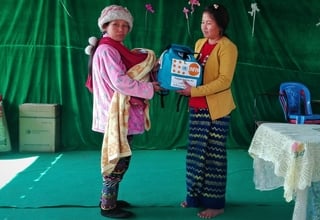Approximately forty representatives from various disabilty groups living in the Yangon region attended a two-day training session from 29-30 April, 2015, organised by the United Nations Population Fund (UNFPA) and the Association of Myanmar Disabled Women’s Affaires (AWDWA) to exchange and learn about the upcoming release of the main Myanmar census results at the end of May.
Daw Khin Zar Naing, UNFPA Senior Programme Officer gave a detailed overview of the census process, starting with the enumeration count which took place from 29th March to 10 April 2014, to the various data processing and analysing stages. She took the participants right up to the upcoming expected release of the main census data. “The main census results will give us a precise figure of the number of the population of Myanmar that has a disability and the results will tell us in which part of the country they live,” said Daw Khin Zar Naing.
U Kyaw Yu, 48 years old and the Chairman of the Yangon Deaf Association said that prior to the training he had only limited knowledge of the enumeration count. “When the enumerator came to my house, it was not made clear to me what was going on, as she did not know how to explain the questionnaire form to us. At the two day training we had an interpreter who was able to explain everything to us using sign language. So even though the census count is now over, we now understand it better,” said U Kyaw Yu. He also stressed that he would use his new found knowledge on the census and share it with his family and local community. When asked what he thought the benefit of the census data would be, he said that it could help with providing disabled persons with more possibilites in the future.
Another participant of the census training was 29 year-old Ma Moe Thidar Lin, who lives in a semi-urban squatting community in the west of Yangon. She has weak limb and this makes it hard for her to walk. She said that every day she faces discrimination. “My sister and I live in a squatter neighbourhood and people look down on us. I know it and I can feel it.” However after having attended the census training, she said she felt uplifted as before she was very afraid of the census because she did not have the required identity card. But now she felt that she could go back to her neighbourhood with her head held high. “At the training I was treated as an equal. I was listened to and the trainers discussed things with me. I shall never forget this,” she added.
The two-day training were part of a country-wide effort that is underway, involving 32 different civil society organisations (CSOs) and 5 UNFPA implementing partners. They are undertaking dialogues and orientation trainings to help highlight the importance of the results of Myanmar’s census data. They constitute of a mixed group of local organisations, such as youth and women groups, ethnic groups and faith groups. It will be the first time in over three decades that the country has access to solid data. The census process provides credible and reliable data that is needed for development planning and policy making . The results, once analysed, will show how and where services need to be improved, such as health care, education and utilities. This will be for the benefit of all the people of Myanmar and help spur on the on-going reform process.



